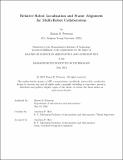Relative Robot Localization and Frame Alignment for Multi-Robot Collaboration
Author(s)
Peterson, Mason B.
DownloadThesis PDF (9.642Mb)
Advisor
How, Jonathan P.
Terms of use
Metadata
Show full item recordAbstract
The growing field of collaborative robotics has the potential to enable and improve the execution of many challenging robot applications. For instance, with teamwork between multiple agents, dynamic object tracking can more completely cover an environment and trajectory planning becomes safer. However, for robots to share the quickly changing spatial information involved in these tasks, robots need to be able to express information originally sensed or planned in their own frame into the frame of neighboring agents. This can be challenging in cases where robots have no global pose information resulting in steady accumulation of error, or drift, in their local pose estimates. To mitigate the effects of drift, neighboring agents must make up-to-date estimates of the alignment between their frames, which can be difficult due to ambiguous alignments and the presence of outlier measurements. To address these issues, the first contribution of this thesis is a method for performing fast incremental frame alignment between pairs of robots, enabling collaborative multiple object tracking (MOT), the task of monitoring the locations of dynamic objects in an environment. To perform frame alignment, robots build up maps of recently seen static objects and use these maps and the detections of tracked dynamic objects to correct for frame drift. Using frame alignment estimates, agents share object detection information and account for additional uncertainty associated with the alignment estimate. The second contribution of this thesis presents a method to perform frame alignment with no initial guess. Many potential frame alignments are computed and we develop a filter that uses temporal consistency to reject outlier alignments and only accept a series of alignments that are consistent over time. We demonstrate in hardware experiments our ability to perform frame alignment in difficult scenarios and improve the quality of collaborative object tracking onboard real robots.
Date issued
2024-05Department
Massachusetts Institute of Technology. Department of Aeronautics and AstronauticsPublisher
Massachusetts Institute of Technology